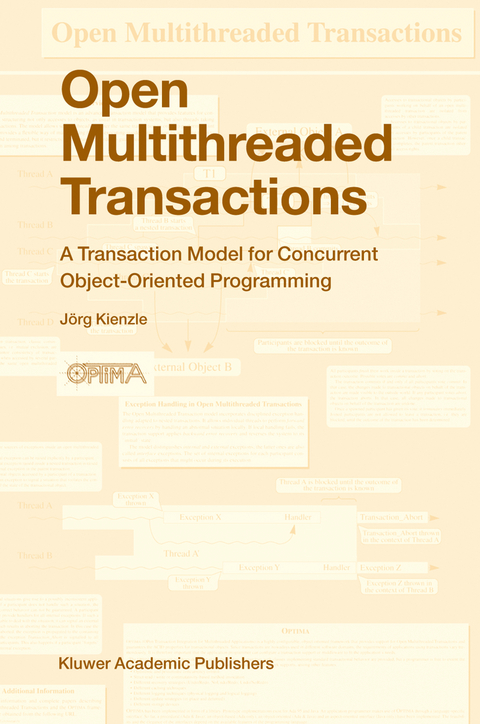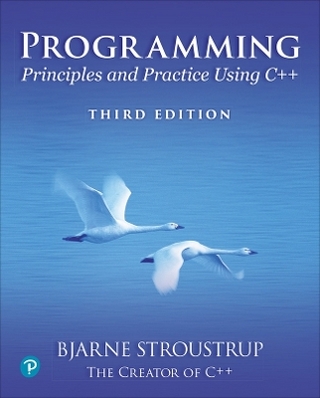
Open Multithreaded Transactions
A Transaction Model for Concurrent Object-Oriented Programming
Seiten
2003
Springer-Verlag New York Inc.
978-1-4020-1727-8 (ISBN)
Springer-Verlag New York Inc.
978-1-4020-1727-8 (ISBN)
Investigates how transactions can be integrated with concurrent object-oriented programming, and how transactions can be made available to an application programmer at the programming language level. This book gives an overview of transaction models, and analyzes their suitability for concurrent programming languages.
Modem computer systems possess two main characteristics: their ever- growing complexity and the increasing number and range of abnormal situa- tions they have to cope with successfully in order to deliver the service. Developing such systems is ademanding task requiring discipline and cIear thinking, which are best ensured by the right design mechanisms aiming at both appropriate system structuring and a disciplined provision of fault toler- ance. The groundlaying research of the 60s and 70s created a solid basis in this area by developing a number of fundamental mechanisms, such as ACID (atomicity, consistency, isolation and durability) transactions, atomic actions (Brain Randell's conversations) and exception handling. Later on, a number of advanced techniques were proposed to overcome some of the limitations and rigidity of these mechanisms and to allow system developers to effec- tively deal with specific characteristics of a particular application, an applica- tion domain, design paradigm and execution environment. These incIude a variety of advanced transactional schemes and a number of novel exception handling techniques.
In the last years, there has been a surge of interest in developing more advanced mechanisms combining properties of several fundamental mecha- nisms to make it easier for system developers to cope, in a more flexible and efficient fashion, with complexity, distribution and heterogeneity of emerging applications as weil as with an increasing variety of possible faults.
Modem computer systems possess two main characteristics: their ever- growing complexity and the increasing number and range of abnormal situa- tions they have to cope with successfully in order to deliver the service. Developing such systems is ademanding task requiring discipline and cIear thinking, which are best ensured by the right design mechanisms aiming at both appropriate system structuring and a disciplined provision of fault toler- ance. The groundlaying research of the 60s and 70s created a solid basis in this area by developing a number of fundamental mechanisms, such as ACID (atomicity, consistency, isolation and durability) transactions, atomic actions (Brain Randell's conversations) and exception handling. Later on, a number of advanced techniques were proposed to overcome some of the limitations and rigidity of these mechanisms and to allow system developers to effec- tively deal with specific characteristics of a particular application, an applica- tion domain, design paradigm and execution environment. These incIude a variety of advanced transactional schemes and a number of novel exception handling techniques.
In the last years, there has been a surge of interest in developing more advanced mechanisms combining properties of several fundamental mecha- nisms to make it easier for system developers to cope, in a more flexible and efficient fashion, with complexity, distribution and heterogeneity of emerging applications as weil as with an increasing variety of possible faults.
1 Fundamental Concepts.- 2 Transaction Models.- 3 Open Multithreaded Transactions.- 4 Overall Design.- 5 Transaction Support.- 6 Concurrency Control.- 7 Recovery.- 8 Interfacing with Programming Languages.- 9 Ada 95.- 10 Implementation for Ada 95.- 11 Related Work.- 12 Online Auction System.- Author and Citation Index.
| Erscheint lt. Verlag | 30.11.2003 |
|---|---|
| Zusatzinfo | 26 Illustrations, black and white; XXV, 279 p. 26 illus. |
| Verlagsort | New York, NY |
| Sprache | englisch |
| Maße | 160 x 240 mm |
| Themenwelt | Informatik ► Software Entwicklung ► Objektorientierung |
| ISBN-10 | 1-4020-1727-8 / 1402017278 |
| ISBN-13 | 978-1-4020-1727-8 / 9781402017278 |
| Zustand | Neuware |
| Haben Sie eine Frage zum Produkt? |
Mehr entdecken
aus dem Bereich
aus dem Bereich
objektorientierte Entwicklung modularer Maschinen für die digitale …
Buch | Hardcover (2024)
Hanser (Verlag)
CHF 62,95
Entwicklung von GUIs für verschiedene Betriebssysteme
Buch (2023)
Hanser, Carl (Verlag)
CHF 55,95
Principles and Practice Using C++
Buch | Softcover (2024)
Addison Wesley (Verlag)
CHF 119,95


